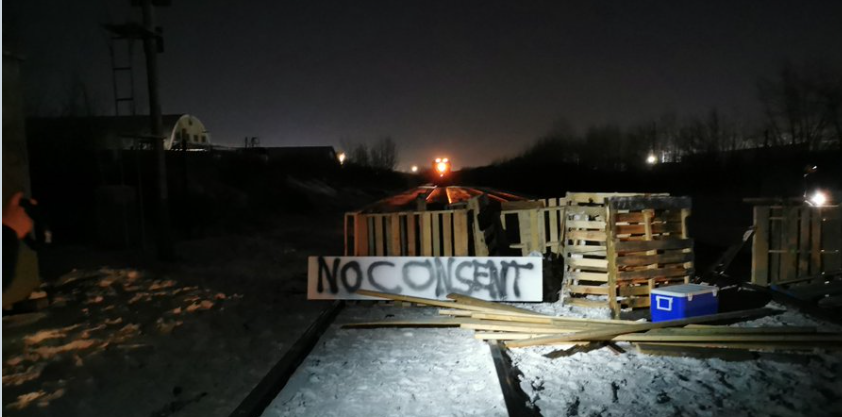
The political situation in Canada is intensifying, as Prime Minister Justin Trudeau continues to push for a “business-as-usual” solution to Indigenous rights and the climate crisis – which has been met with nationwide blockades in support of the Wet’suwet’en First Nation’s opposition to the Coastal GasLink pipeline.
The CAD 6.2 billion Coastal GasLink pipeline would transport fracked natural gas pipeline from northeastern B.C. some 670 kilometers to the coast where the CAD 40 billion LNG Canada facility (said to be the largest single private sector investment in Canadian history!) is due to be constructed too.
As I wrote earlier this month, “The scheme is not just a climate disaster, but a full-front assault on First Nations sovereignty, as it crosses Wet’suwet’en land. Building on a long history of militarized police brutality against the Wet’suwet’en and other nations, yesterday the federal Royal Canadian Mounted Police (RCMP) began enforcing a B.C. Supreme Court order to make way for construction of the Coastal GasLink.”
Ever since the RCMP moved into enforce the injunction, protests have sprung up across Canada targeting key infrastructure links such as rail lines, ports, and bridges.
One of those standing in solidarity are the Tyendinaga Mohawks. As the New York Times reported yesterday: “The Mohawk protesters say they won’t let trains roll again until the police leave the pipeline route the Wet’suwet’en are contesting in British Columbia.”
And every protest and solidarity action gives the Wet’suwet’en strength. “People feel inspired by what’s happening here and the strength of our hereditary chiefs, “Wet’suwet’en Governance Director Molly Wickam told The New Republic. “But we’re inspired equally by the strength of the rest of the country, from coast to coast, and what people are willing to do.”
What is Trudeau willing to do to end the escalating crisis?
He has a choice. He can carry on the fossil fuel economy, and bludgeon First Nations rights in the process or he can de-escalate, de-carbonize and de-colonize.
Some have already suggested a way forward to de-escalate the situation. Writing in the Globe and Mail last month, Hon. Jody Wilson-Raybould, the independent member of Parliament for Vancouver Granville in British Colombia, called on all sides to seek reconciliation, requiring “transitioning from the colonial system of government imposed on First Nations through the Indian Act, to systems of Indigenous governance that are determined by Indigenous peoples and recognized by others.”
More recently, others have pointed out to Trudeau that he could respect the Wet’suwet’en “hereditary chiefs who have jurisdiction to the territory, and they have been clear about their aim – to assert self-governance over their land and demand a nation-to-nation relationship with Canada. It’s a move that would benefit all Wet’suwet’en.”
Speaking in Parliament yesterday, Trudeau urged patience, but essentially offered no solutions: “I know that people’s patience is running short. We need to find a solution and we need to find it now,” Trudeau said: The dispute should be settled by “dialogue and mutual respect.”
He added: “People are troubled by what they have been witnessing this past week. Young, old, indigenous, newcomers. They are asking themselves what is happening in this country. They are asking what lies ahead, for themselves, for their communities, and for Canada. They know that these protests are serious. That this is a critical moment for our country and for our future. And so do I.”
But Trudeau did not talk about de-escalation or recognizing First Nations sovereignty.
The response from his critics was brutal. The Canadian Green MP, Elizabeth May, said: “this urgent situation requires absolutely everyone to face reality – the reality of injustice and challenge of reconciliation”. She added that Indigenous people had had their “land stolen from them, their children stolen from them, their culture stolen from them and efforts to annihilate them as peoples.” She added the situation was not simple as it was based on a century and a half of oppression and colonialism.”
Good for Elizabeth May and the greens. Finally someone calling it like it is within parliamenthttps://t.co/zbAsKSufC0
— c battle (@c_l_battle) February 19, 2020
Twitter was not impressed either:
Listened to Trudeau for 6 minutes. He’s pitching the status quo. No vision. No answers. No bravery. No willingness to admit wrong. Shocker. #cdnpoli #Wetsuweten
— Ryan McMahon (@RMComedy) February 18, 2020
Meanwhile, if Trudeau will not act, maybe the courts will. Two Wet’suwet’en Nation hereditary chiefs have launched a constitutional challenge to force Trudeau to commit to climate targets by modifying or cancelling the GasLink pipeline.

